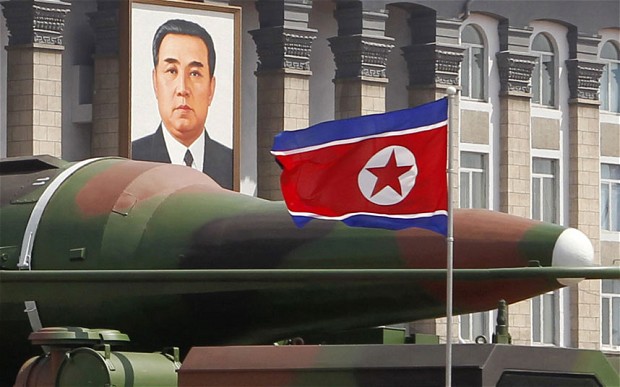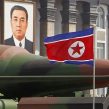
Russia Reacts Predictably to North Korean Nuclear Test
Publication: Eurasia Daily Monitor Volume: 10 Issue: 37
By:

Since it participates in the six-party talks on North Korea’s nuclear disarmament, Russia has a vital interest in developments there. Therefore, Russia’s governmental and expert community reactions to the North Korean nuclear test on February 12 possess importance both for the six-party process and for Moscow’s Korean, Asian and nonproliferation policies. The Democratic People’s Republic of Korea (DPRK) had officially informed Russia of its impending test. This led Moscow (at South Korea’s request) to pressure Pyongyang to abandon the test as a threat to world peace (Yonhap, February 13; Interfax, February 14). North Korea disregarded this pressure.
Given its formal opposition to North Korean nuclearization, Moscow also condemned the test and demanded that Pyongyang return to the Nuclear Non-Proliferation Treaty (NPT), accept International Atomic Energy Agency (IAEA) safeguards, and stop its nuclear missile program—largely an impotent and futile gesture (Interfax-AVN Online, February 12). It also condemned the test as a breach of United Nations Security Council (UNSC) resolutions banning a “test launch of a ballistic missile carrying a satellite” (Russia Beyond the Headlines, February 12). Furthermore, Russia announced that it was willing to discuss steps the UNSC could take in response to the atomic weapons test, thus reaffirming Moscow’s position that it would only accept a collective, UNSC-authorized response against North Korea (Interfax, February 13). To reinforce its point, Russia also ruled out unilateral sanctions on North Korea. Moreover, Russia opposed any South Korean or US military buildup in response to this test, clearly displaying its concern over Seoul’s new long-range missile capabilities and warning against using this test as a pretext for such a change in the military balance on the peninsula (Interfax, February 14). Meanwhile, Russian Foreign Minister Sergei Lavrov urged that there be no “hysteria” because of the test (Interfax, February 12).
Advocating calm is nice but unproductive. Rather, its response shows that Moscow actually has no means of influencing North or probably even South Korea on defense issues. An article in Kommersant before the test argued that Russia lacks leverage over North Korea, having surrendered it to China. Moscow’s greatest fears, therefore, are both a rash North Korean act and Western exploitation of this crisis to strengthen its regional military presence (Kommersant, February 6). Regarding Korea, nonproliferation and Asian security, Moscow actually fears Washington and its allies as much as—if not more than—North Korea’s possible recklessness. As many, including this author (https://www.strategicstudiesinstitute.army.mil/pubs/display.cfm?pubID=1085), have noted, Moscow’s posture allows Pyongyang to continually raise the ante and push the envelope with impunity.
Moreover, the Kremlin’s policy framework drives the Russian expert community’s assessments. Alexander Zhebin, head of the Korea Studies Center at the Russian Academy of Sciences, and Fedor Lukyanov, the editor-in-chief of Russia in Global Politics magazine, have both argued that North Korea’s position is logical. Pyongyang desires equal membership in the nuclear club and the UN and tries to achieve it through such behavior despite the inherent danger of brinksmanship. Zhebin noted, accurately, that current containment measures had failed, while Lukyanov maintained that it is indeed possible to negotiate with North Korea since its nuclear program is for deterrence not offensive action (Ekho Moskvy Radio, February 12). However, these conclusions are not necessarily so obvious to outside observers. In a similar vein, Igor Linge of the Academy of Sciences argued that it would take the DPRK another 5–7 years to become a nuclear power given the colossal strain it required, and he was doubtful of North Korea’s prospects (Interfax, February 12). Russian Academy of Sciences Korea expert Georgy Toloraya even argued that if it came to an inter-Korean war, the North would not use nuclear weapons against the South, sparing those for Japan or the US, and that Pyongyang’s nuclear capabilities are more imaginary than real even though it also tested a 5,000-kilometer-range rocket (RT, February 17). Like Zhebin, he contended that the North Korean missile launch was an attempt, however misguided, to threateningly compel the US to engage with the DPRK (Golos Rossii, RT, February 17). Other commentators, like ITAR-TASS journalist Vasily Golovnin, agreed with this assessment (Novaya Gazeta, February 13). Toloraya concluded that in the long term there is no alternative to the six-party talks since sanctions do not work. However, it is clear to both him and Zhebin that Washington cannot and will not go back to that arrangement anytime soon, lest it appear to be capitulating to Pyongyang (Golos Rossii, February 17; Ekho Moskvy Radio, February 13).
Federation Council Foreign Affairs Committee head Mikhail Margelov and Carnegie Moscow Center associate scholar Petr Topychkanov, on the other hand, both worried that North Korea’s February nuclear test might pressure South Korea and/or Japan to go nuclear themselves (Interfax-AVN Online, Interfax, February 12). Other experts or commentators, meanwhile, embraced even more unlikely scenarios. Chairman of the Russian Duma’s International Affairs Committee Alexei Pushkov, considered by many observers to be one of the most vocal and stridently anti-American voices in Russia, actually claimed that this test should lead Washington and Moscow to cooperate to promote a nuclear-free Korean peninsula. In saying so, Pushkov completely ignored the many years that the US has already pursued such a policy, while overestimating other regional players’ openness for such a closer Moscow-Washington relationship at their expense (Interfax-AVN Online, February 13). A common theme here is that the sanctions and the six-party talks have failed; but the talks remain the only alternative, and only dialogue with North Korea can bring a real result. Viktor Ozerov of the Federation Council made such an argument, seemingly oblivious to North Korea’s repeated betrayal of its commitments, including the most recent agreement of February 29, 2012. Senator Radik Ikudzhin even called for milder sanctions and stronger humanitarian and economic aid (Russia Beyond the Headlines, February 12).
Russian policy and commentary regarding the DPRK show that Moscow’s refusal to support Washington has led Russia into a wilderness of outlandish and unrealistic assessments. Not surprisingly, Artyom Lukin of Far Eastern Federal University probably rightly argues that ultimately Pyongyang’s nuclear test will inspire nothing other than another round of verbal criticism (Interfax, February 12). But that conclusion underscores the bankruptcy of the Kremlin’s Korean policy, which fears Washington more than the actual regional threats to Russian interests. For a country that endlessly claims to be a great power, confessions of bankruptcy and futility are a strange way to obtain that recognition or protect its vital interests.




